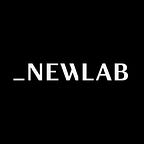By New Lab
Tom Serres and Bettina Warburg are the co-founders of Animal Ventures, a prototyping studio (and New Lab member company) at the intersection of technology, politics, and broader societal change. (Bettina’s lucid TED talk on blockchain has been viewed 3 million times.)
1. First off, can you tell us a bit about the work Animal Ventures is doing? TS: Animal Ventures is a prototyping firm. We experiment a lot with things like blockchain, IoT, additive, and we spend a deep amount of time in the world of supply chain, working directly with supply chain groups — mainly at Fortune 100 companies.
2. Cryptocurrencies are very unstable, and it’s a captivating market to watch. What are the efforts being made to stabilize it? Should stabilization even be a goal? TS: We’re not really fans of the concept of cryptocurrency, in general — in fact I would dare to say most of these things are not “currencies.” BW: It’s kind of an unfortunate anchor for people — when they hear the word “cryptocurrency,” the anchoring word is “currency,” and so they think that blockchain and cryptocurrencies have a lot to do with those more financial applications, instead of modern day blockchains, and second-generation versions of it, that are articulating a new way of thinking about computing power. We often say the most powerful words in Satoshi Nakamoto’s whitepaper that formed Bitcoin are “peer-to-peer” — it wasn’t “cash.”
3. You host the podcast Tech on Politics — what are the potential applications of blockchain as it pertains to government and governing? TS: We started the podcast a couple years ago, because we were concerned that it is technologists, more than government, who are shaping the world. When you think about Facebook as an example — some of the first words out of Mark Zuckerberg’s mouth were “privacy is dead.” If you sit back and think about how this guy has built a company that shapes the lives of over a billion people on the planet, and he believes privacy is dead — how does that impact society overall? BW: We talk a lot about something that might sound unsexy: it’s what we call “compliance innovation.” A lot of businesses today spend a lot of money trying to be compliant in whatever industry that they’re in — especially if they’re a heavy supply-chain industry. And our government bodies are basically trying to go audit all of that work, and make sure it is compliant. There’s this whole opportunity space in not doing those things separately. It’s a really interesting concept, and I think it challenges our traditional ideas of the roles between government and business. I think we’re opening up a whole world of compliance innovation, which gives us a chance to have checks and balances between those power dynamics in a really powerful way.
4. How important is transparency in the future economy? Is transparency good? BW: On some level, we’re entering the space where privacy is being re-calibrated. Privacy, anonymity, confidentiality — being able to use data, and compute dense data without having it be visible to everyone, is an important part of the advantage of the blockchain space. TS: Take the example of the legal drinking age of 21. You go to a liquor store; you show your driver’s license. When they look at it, they can see where you live, your height, your weight, the fact that you’re an organ donor. At the end of the day, they just need to know whether you’re of age to drink alcohol — they don’t really even need to know how old you are! In relation to this particular form of legal compliance — a Zero Knowledge Proof is the ability to query that data and present the answer. A blockchain-based identity system could provide this to the world.
5. We’ve been reading about the environmental impact of blockchain — are there efforts underway to address its energy usage? What happens if a large bank or credit card provider moves their business to a network like Ethereum — would that destroy the planet, or could this be one unlikely inroad to a more sustainable future? BW: It’s true that there is high energy consumption and environmental impact of blockchain. But it’s important to keep in mind that what we’re dealing with today are early stage versions of blockchain. A bank will not be switching its entire architecture over to Ethereum. Much of the energy waste comes from the amount of computing power used in order to secure proof-of-workspace blockchain, which is what bitcoin and currently Ethereum are. We always talk about blockchain as an emerging science, because it’s pulling from a lot of disciplines. The reality is, we are just at the beginning of tinkering with all of the functions — there’s this whole third generation, and further versions of blockchain, that are achieving security and scalability and not relying on the kinds of mechanisms that are very heavy energy consumptive mechanisms. This is a problem today but it’s one of the areas that will be a byproduct of all of the other innovations in this space: it will also go away.
